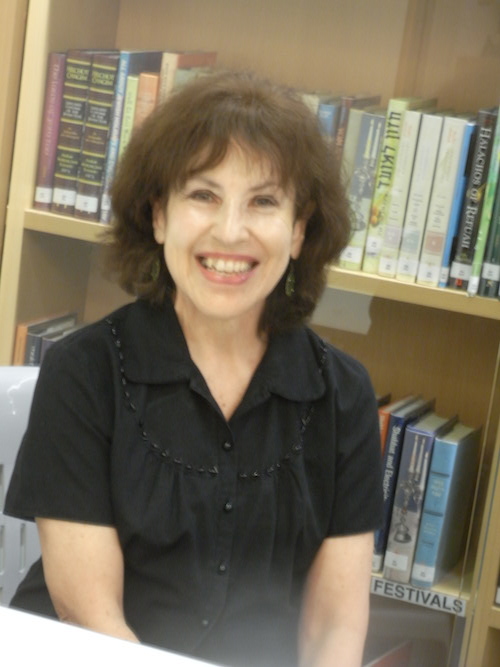Baseball and Grieving - President's Message 4/11
04/11/2016 01:36:21 AM
| Author | |
| Date Added | |
| Automatically create summary | |
| Summary |
Six weeks ago I wrote about my friend Ike, a prominent New York psychiatrist, a son of Holocaust survivors who grew up in the Washington Heights neighbourhood of Manhattan. Dr Isaac Herschkopf is a good and interesting writer and below I share two of his recent articles.
The first is about baseball. Like Ike, I am a dyed-in-the-wool Yankee fan. I grew up in the Bronx just a mile north of Yankee Stadium. The great players in my formative years (the early 1960s) were Mickey Mantle, Roger Maris (he set a home-run record) and left-handed pitcher Whitey Ford. As I write (on Thursday) the Chicago Cubs have just beaten the Cleveland Indians tow in the 2016 World Series: it was a thrilling game 7, the Cubs having come back from losing three of the first four games. The Cubs are one of the oldest baseball teams; they last won the World Series in 1908.
The second article is about grieving. Ike tells me that he was thinking about the Torah reading for Yom Kippur from Acharei Mot, referring to the deaths of Aaron’s two sons, Nadav and Avihu. Why and how they died has been the subject of many commentaries. After Moses tries to console his brother – by saying that those sons were sanctified by God, that they were greater and holier than others – Aaron was silent. The actual Hebrew words are: Va’Yidom Aaron. Some commentators note that the expression va’yidom is used in only one other place in the bible, in the story of the battle at Gibeon. In a battle with the Canaanite kings, God stopped the sun in its path so that Israel would have time to defeat its enemies: “Stand still (dom), oh, sun, at Gibeon; oh, moon, in the valley of Aiyalon.” (Joshua 10:15) The term dom implies a moment of complete and absolute paralysis. Ike notes the possible reference in the term to dam, blood (remember, the first plague). In any event, he will make you think harder about Aaron’s response.
* * * * *
Why I’m A Yankee Fan
By Isaac Steven Herschkopf
It was my first day of school. A group of my new classmates surrounded me and asked that most critical of questions: What team do you root for?
I was the proverbial deer in the headlights. I said I didn’t know. They insisted I had to know. Was I a Giants fan, a Yankees fan, or, God forbid, a Dodgers fan?
Growing up in Washington Heights in the ’50s meant that you rooted for one of those three teams. The Giants played in the Polo Grounds, blocks from us. The Yankees were also walking distance, but across the river in the Bronx. The Dodgers required a subway ride into Brooklyn.
I assumed that there was an objective answer, like a religion or your blood type. Surely I had been assigned to one of these teams. I only knew one way to determine it. I went home and asked my mother.
She, a self-described greenhorn, looked up my birth certificate, my hospital records and my school application, but could not find any reference to baseball teams. We were both at a complete loss.
Then, she remembered something. She went into my underwear drawer and found the Rosetta stone, a Yankee T-shirt. It was worn and faded and I had clearly outgrown it. It was undeniable proof; I was a Yankee fan.
Konrad Lorenz was a scientist best known for his discovery of the phenomenon of imprinting. In the critical hours following an animal’s birth, it assumes that the first animate being it sees is its mother. Hence, the famous Life Magazine photo of Lorenz being instinctively followed by a string of chicks unalterably convinced that he is their mother be fully erased.
So it is with me. Like it or not, I am a Yankee chick. For the rest of my life, every night, from April through October, my mood is elevated by news of a Yankee victory, and diminished by a Yankee loss.
To be frank (appropriate to a ballpark), I hate it. I pride myself on my objectivity. I am a psychiatrist. I teach people to discipline their emotions rather than be controlled by them.
Yet, when it comes to the Yankees, I am helpless. I understand that it makes no sense. I treat professional athletes. I know their priority is, understandably, their livelihood, not their team. They have no real allegiance to an arbitrarily named group of hired guns.
They don’t care about the team, or the city. Few Yankees live in New York in the off-season, or grew up here. Roger Clemens, Wade Boggs, Johnny Damon, et al. had no problem playing for the Yankees one year and their archenemies, the Boston Red Sox, another. Yankee Stadium might be the house that Ruth built, but even the Babe played for the hated Sox before and after his stay here. If the Babe didn’t care about the Yankees, why should I?
Over the years, I have come to know many Yankee players, managers, administrators and owners personally. I have liked some, been neutral about most and despised others. Why root for an individual who doesn’t like me, and whom I cannot stand? I shouldn’t, and yet, I do.
Rooting for a high school or college team makes sense. A school is an institution; it represents its students, faculty and alumni. It has tradition; it has permanence. It doesn’t change; it doesn’t move, like the Boston/Milwaukee/Atlanta Braves.
If I was going to root for a baseball team, it would be the Cubs, who haven’t been to a World Series in over a century, not the Yankees, who expect to be in the Fall Classic annually by divine right.
I will not be buried in an authorized Yankee coffin, nor have my ashes spread on the Bronx base paths, as others have. Yet, if I start to experience dementia as I decline, I will probably still remember the wool coat I was wearing on that blustery October day in 1960 when I was standing in front of an appliance store on Broadway. I was watching Bill Mazeroski on a black-and-white television in the window when he hit a home run off of Ralph Terry to win the World Series as my friends and I burst into tears. My corpse will still have the ugly scar on my abdomen where I burst the stitches on my appendectomy in my hospital bed during an ill-advised primal whoop when Bobby Richardson caught Willie McCovey’s speeding bullet line drive to win the 1962 World Series.
In retrospect, my mother and I were wrong. Being a baseball fan is as unalterable as any blood type, as spiritual as any religion. If you were raised in a particular faith, you never stop believing.
My mother threw out that Yankee T-shirt as soon as she found it. She shouldn’t have.
I never really outgrew it.
Aaron Was Silent
By Isaac Steven Herschkopf
On Yom Kippur, the holiest day of the Jewish year the Torah portion that we read refers to the death of Aaron’s two “righteous” sons. They were burned to death because, while intoxicated, they had brought a flame into the holiest part of the temple sans permission.
Though it was assumed that it was, in this manner, that God had punished them for their sin, Moses attempted to console his brother by pointing out that, in this manner, God “sanctifies” and “glorifies” those who are closest to Him. In response, “Aaron was silent.”
The most challenging part of being a psychiatrist is calibrating the optimal distance between yourself and your patients whom you are trying to help. It is never more difficult than when you meet a parent who has lost their child. For the sake of your professionalism, you have to maintain your composure. For the sake of your own humanity, and theirs, you have to communicate your anguish.
The most challenging part of being a friend is paying a condolence call to your buddy who lost their child. There, the optimal distance is easier to calibrate. Get as close as you can, physically and emotionally. Hold on, and don’t let go.
There are two kinds of Shivas. It is a very transparent dichotomy. In the vast majority, when a parent or grandparent passes in a timely fashion, as you open the unlocked door to enter, you hear laughter. In some ways, it feels like a party. The mourners and their guests are exchanging humorous, affectionate anecdotes about the deceased. Their passing is being sanctified by their glorious life being celebrated.
Then, there is the other kind of Shiva. You open the door with trepidation. You know that there will be more people there than you can imagine, but that, nevertheless, the overcrowded room will be filled with extended silences and muffled tears. Visitors won’t want to leave, but they will not know what to say. This is how we mourn the passing of a child, of any age. Nothing could be more untimely, or more tragic.
Frequently, on those occasions, well-meaning visitors, be they clergy or laity, will attempt to emulate Moses: “This is the highest compliment that God could have paid your child.” “He couldn’t wait to welcome your child to heaven.” “The most godly of us enter heaven the soonest.” Or, to quote Billy Joel: “Only the good die young.”
To be sure, this is a vast improvement over what I, and many of my generation, was taught by some of our rabbis: ”God always has His reasons when He punishes someone. When someone dies prematurely, it might not be obvious to us how they sinned, but God knows.”
Perhaps we needed the Holocaust, and six million blameless victims, to reduce, though not totally eliminate, this obscene philosophical justification of inequitable outcomes.
Although the complimentary comments are always well intentioned, they, rarely, if ever, comfort the bereaved parents. If sufficiently aggrieved, they might, to their subsequent regret, respond sharply. There are always the generous few, who despite their ungodly circumstances, can recognize the speakers’ noble intentions and positively reinforce them. The vast majority however, tend to emulate Aaron, and remain silent.
I was sitting next to my friend Steve as he sat Shiva for his son, when someone offered such a comment suggesting that his son had been sanctified and glorified by his premature, traumatic death. I don't remember the exact comment, but I remember Steve turning to me and, with an enigmatic smile on his face, asking me what “the psychiatrist” thought. I don’t remember my exact response, but I recall respectfully disagreeing on behalf of Steve, simultaneously trying not to embarrass the speaker.
Like Aaron, Steve was silent, but I was pleased to see his smile broaden. It was the only time that I saw him smile that evening, and for some time thereafter.
The verb that the Torah uses for Aaron being silenced is an enigmatic one as well, Va’Yidom. The word contains within it the words for “red”, and “blood”.
In my mind, when Aaron heard his brother trying to justify God killing his sons as a compliment to them, he was not only silent, but also, his face reddened. It reddened because it was filled with blood.
It was paradoxical that his face was filled with blood because it was due to his own blood being spilled. In my mind, Va’Yidom is the saddest word in the entire Torah.
When we lose a child, we lose a part of ourselves. It leaves a vacuum within us that is never filled.
Children’s deaths can never be sanctified. Though we read about them on our holiest day of the year, there is nothing holy about it. Like the rationalizations justifying it, it is obscene.
There was glory in their lives, not in their deaths.
Aaron was right to be silent.
Mon, 25 August 2025
1 Elul 5785
Contact Us:
Today's Calendar
| Rosh Chodesh Elul |
| Shacharis : 6:30am |
: 9:10am |
: 5:30pm |
| Mincha : 5:35pm |
: 5:57pm |
This week's Torah portion is Parshas Shoftim
| Shabbos, Aug 30 |
Candle Lighting
| Friday, Aug 29, 5:17pm |
Havdalah
| Motzei Shabbos, Aug 30, 6:13pm |
Rosh Chodesh Elul
| Monday, Aug 25 |
Full Calendar Here
Happy Jewish Birthday!
Monday 1 Elul
- Toby Levine-Evans
We wish "Long Life" to:
Monday 1 Elul
- Elaine Bolon for father, Gerald Sender
Wednesday 3 Elul
- Cecille Levin for husband, Gerald Philip Levin
- Gary Weiss for uncle, Berl Yisosko Dov Frankl
Halachik Times
| Alos Hashachar | 5:09am |
| Earliest Tallis | 5:38am |
| Netz (Sunrise) | 6:23am |
| Latest Shema | 9:10am |
| Zman Tefillah | 10:06am |
| Chatzos (Midday) | 11:58am |
| Mincha Gedola | 12:25pm |
| Mincha Ketana | 3:13pm |
| Plag HaMincha | 4:22pm |
| Shkiah (Sunset) | 5:32pm |
| Tzais Hakochavim | 5:57pm |
| More >> | |
South Head Catering

South Head Catering is well and truly on the map! What began as a small initiative to provide a little variety and some new options by the South Head Ladies Guild has turned into a highly successful venture with people absolutely raving about the service and products on offer.
Want to know more? Want to help out and volunteer? Visit our Catering page.
Mikvah Aziza
Mikvah Aziza at 662 Old South Head Road, Rose Bay has re-opened.
Please click here for details:
South Head Library
 Welcome to the Sandra Bransky Library & Youth Synagogue, located on the first floor and including the Beit Midrash. Drop in any Sunday morning between 9 - 11am.
Welcome to the Sandra Bransky Library & Youth Synagogue, located on the first floor and including the Beit Midrash. Drop in any Sunday morning between 9 - 11am.
I look forward to helping you get the most out of our beautiful world of books at South Head.
Sylvia Tuback, South Head Libarian
southheadlibrary@gmail.com
SHOFTIM
Rose Bay, NSW 2029
(02) 9371 7300
Privacy Settings | Privacy Policy | Member Terms
©2025 All rights reserved. Find out more about ShulCloud



